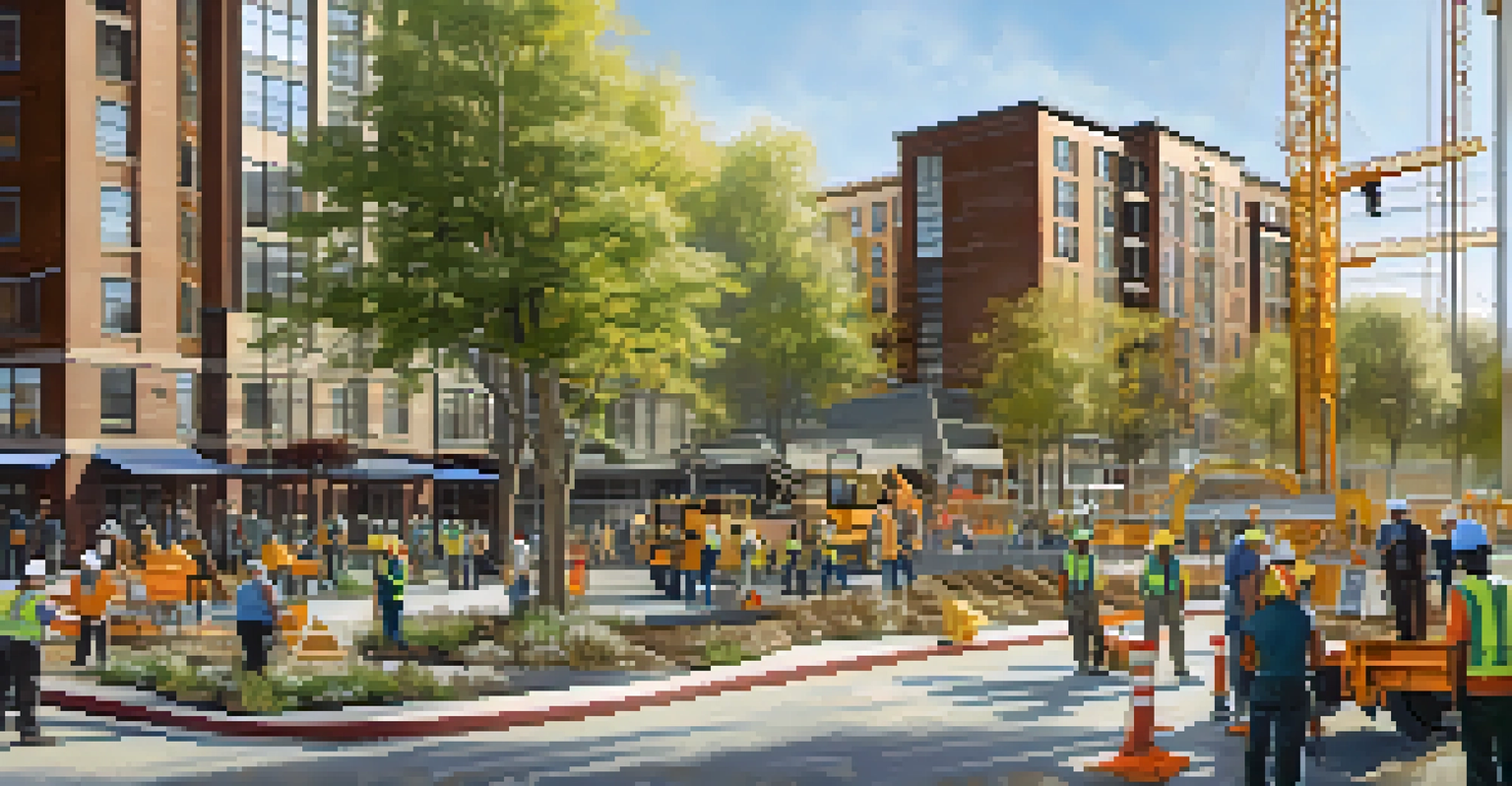Reno Real Estate Development: Opportunities and Challenges

Reno’s Real Estate Market: A Growing Landscape
Reno has emerged as an attractive destination for real estate development, with its stunning natural beauty and vibrant community. Over the past few years, the city's population has been steadily increasing, prompting a surge in housing demand. This growth has led to a variety of development projects aimed at accommodating newcomers and enhancing the city’s infrastructure.
Real estate is not just about property; it's about people and their lives.
Developers are keen on capitalizing on Reno’s unique position as a gateway to outdoor recreational activities, which appeals to both residents and tourists alike. The influx of new businesses and the tech sector is also drawing in a younger demographic, further fueling the need for diverse housing options. As a result, the local real estate market is not just expanding; it's evolving.
However, with this growth comes the challenge of maintaining the city's character and ensuring sustainable development. Balancing new construction with the preservation of Reno's historic charm is essential to keeping the community engaged and invested in the city’s future.
Economic Drivers Behind Reno’s Development Boom
Several economic factors are propelling Reno's real estate development. First and foremost, the city's favorable tax environment attracts businesses looking to relocate or expand. This has led to job creation, which in turn increases demand for housing as more people move to the area for work opportunities.

The tech industry, particularly, has found a welcoming home in Reno, thanks to companies like Tesla establishing a significant presence. This influx of tech jobs has not only brought in high-income earners but has also spurred ancillary businesses to set up shop. The resulting economic ecosystem is one that supports real estate growth across various sectors.
Reno's Real Estate Demand Rising
Reno's growing population and influx of businesses are driving a significant demand for diverse housing options.
Furthermore, Reno's strategic location—just a short drive from both California and the Sierra Nevada mountains—makes it a desirable spot for those seeking a balance between urban living and outdoor adventures. As the economy continues to thrive, the real estate market is poised for sustained growth, but developers must navigate the challenges that come with it.
Challenges of Supply and Demand in Reno
As demand for housing in Reno rises, so too does the challenge of supply. The rapid growth in population has outpaced the pace of construction, leading to a tight housing market. Buyers are often met with limited options, which can drive up prices and create competition among potential homeowners.
Sustainability is no longer about doing less harm. It’s about doing more good.
This situation has prompted developers to find innovative ways to increase housing supply while maintaining affordability. Options such as multi-family housing developments and mixed-use projects are gaining traction, as they offer more living spaces without compromising the community feel. However, these solutions require careful planning and zoning approvals, which can be a lengthy process.
Moreover, the rising costs of materials and labor are additional hurdles that developers face. As they strive to deliver quality housing, they must also manage these rising expenses, which can affect the overall pricing of new developments and impact affordability for residents.
Regulatory Environment: Navigating the Red Tape
Developers in Reno must navigate a complex regulatory environment that can sometimes hinder progress. Zoning laws, building codes, and environmental regulations all play a crucial role in shaping the development landscape. Understanding these regulations is essential for developers to avoid delays and ensure compliance throughout the construction process.
Local government initiatives are aimed at streamlining the development approval process, but challenges still remain. Developers often find themselves wrestling with bureaucratic red tape that can slow down project timelines. This can lead to increased costs and frustration, making it necessary for developers to build strong relationships with local authorities.
Sustainability in Development Focus
Developers are increasingly prioritizing sustainable practices to meet community demand and minimize environmental impact.
Despite these challenges, many developers are finding ways to adapt and thrive within the regulatory framework. Collaborative efforts with city planners and community stakeholders can lead to more efficient processes and ultimately better outcomes for everyone involved.
Sustainability in Reno’s Development Future
Sustainability has become a key focus in Reno's real estate development. As the city grows, it’s essential to consider the environmental impact of new projects. Developers are increasingly incorporating sustainable practices, such as energy-efficient designs and green building materials, into their plans to minimize their ecological footprint.
Community awareness and demand for sustainable living options are on the rise, prompting developers to take note. Residents are seeking homes that not only meet their needs but also align with their values, particularly regarding environmental responsibility. This shift is encouraging developers to innovate and consider eco-friendly features in their projects.
Additionally, local government initiatives are promoting sustainability through incentives and guidelines for green development. As the city prioritizes eco-conscious growth, developers who embrace these practices may find themselves at a competitive advantage, appealing to a market that increasingly values sustainability.
Community Engagement: Building Relationships in Development
Community engagement is a vital aspect of successful real estate development in Reno. Involving residents in the planning process fosters a sense of ownership and connection to new projects. Developers who prioritize community input can create spaces that truly reflect the needs and desires of the people they serve.
Public meetings, surveys, and workshops are effective ways for developers to gather feedback and address community concerns. By actively listening to the voices of local residents, developers can identify potential challenges early on and work collaboratively toward solutions. This not only helps in securing approvals but also builds trust and goodwill within the community.
Community Engagement is Essential
Involving residents in the planning process fosters trust and creates developments that align with community needs.
Moreover, successful community engagement can lead to more sustainable developments that enhance the quality of life for residents. When communities feel valued and heard, they are more likely to embrace new projects, resulting in a harmonious coexistence between development and the existing community fabric.
Future Outlook: Trends Shaping Reno’s Real Estate Development
Looking ahead, several trends are poised to shape the future of Reno’s real estate development. The continued growth of remote work is influencing housing preferences, with many seeking homes that accommodate flexible workspaces. This shift may lead to a demand for larger homes or properties with dedicated office areas, impacting development strategies.
Additionally, the desire for urban living mixed with nature is driving interest in mixed-use developments. Projects that combine residential, commercial, and recreational spaces are becoming increasingly popular, allowing residents to live, work, and play within their community. This trend aligns with the growing emphasis on walkability and convenience in urban planning.

As these trends evolve, developers will need to stay attuned to the changing needs and preferences of the market. By embracing innovation and flexibility, they can capitalize on emerging opportunities while addressing the challenges that accompany growth in Reno’s dynamic real estate landscape.